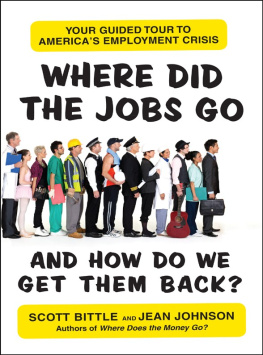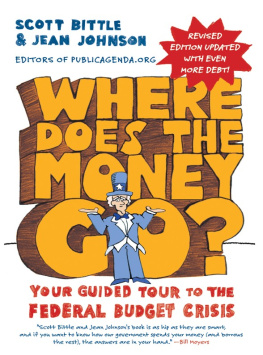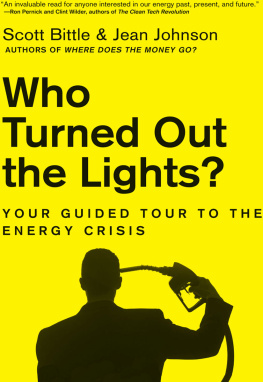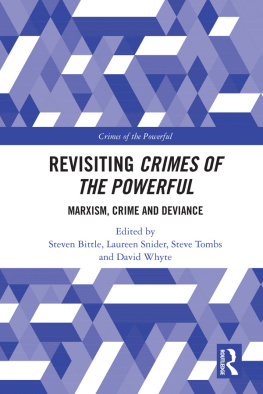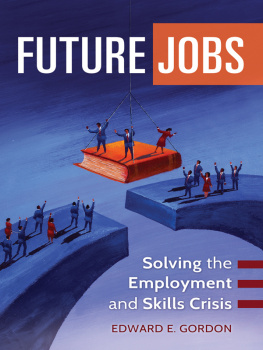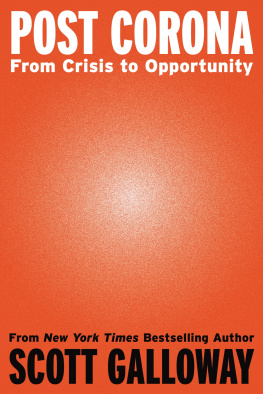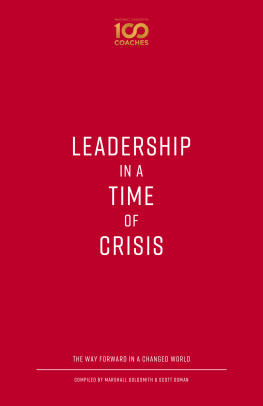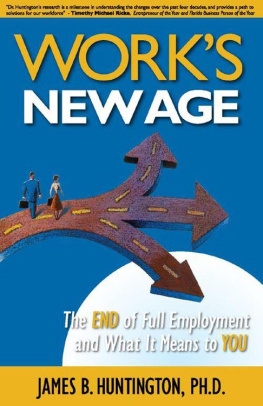I f politics were a Scrabble game, the jobs issue would be the letter E.* It pops up more than just about any other issue the country faces. Elections are won and lost over it. Op-ed writers opine about it. Pollsters interrupt family dinners to ask people how they feel about it. From the White House to city halls, politicians have been speechifying about jobs and unemployment almost incessantly for the last several years. Even when they are talking about other problems, such as the federal budget deficit or energy, they still bring it back to employment: their ideas will create jobs, while whatever their opponent suggests is a job killer. Nearly all of them claim theyve got the right idea for reducing unemployment and getting the economy back to abundant jobs and rising salaries. Just do things my way, they all seem to say, and everything will be fine.
THE NUMBERS ARE ABYSMAL
Theres a good reason why politicians are talking jobs. Since Millions of Americans have seen their financial lives unravel. Some will probably never get back to where they were.
The U.S. economy lost more than 8 million jobs in the recession.
In any given month since the recession hit, some 13 to 15 million Americans have been out of work.
And in any given month, more than 8 million people who wanted full-time work were in part-time jobs instead.
More than 1 American family in every 10 has someone unemployed.
Even people with jobs have been taking a hit. Since the recession, 28 percent of Americans say they have had their hours cut back.
If we were talking about a disease, this would be a pandemic.
A PROBLEM THATS HERE TO STAY
Whats worse, nearly all the smart people (including many who actually are smart) say the jobs situation isnt going to turn around fast. Experts expect unemployment to remain high for years even as other aspects of the economy may be improving.
Since the vast majority of us rely on a job (or jobs) of some kind to put food on the table, this is hardly some abstract, far-off problem for people in posh hotel conference rooms in Washington, D.C. This is something all of us need to understand.
But having enough jobs to go around isnt enoughat least we dont think so. Theres also the question of whether there are enough jobs here in the United States that pay enough for workers to maintain a decent standard of living and still have a little money over at the end of the month. A lifetime spent in jobs that pay peanuts, skimp on benefits, and vanish into thin air every time the economy hits a bump isnt exactly what most Americans have in mind.
CAN WE GET BACK TO WHERE WE BELONG?
Sensing, rightly, that voters are deeply unnerved by whats been happening to American jobs, politicians are scrambling. They have been tossing out ideas for stimulating the economy, creating new jobs, saving old ones, and getting us back to where we were before the great economic meltdown.
The jobs issue is poised to be a major theme in the 2012 presidential election, and other campaigns too. Its hard to imagine that anyone wouldnt like to vote for candidates for president, Congress, governor, and mayor who will make this issue a genuine priority and will also make smart, compassionate, forward-looking decisions about itdecisions that set the United States on a good path for jobs for many years to come. But given what goes on in campaigns these daysthe sloganeering and the posturing, the distortion and the half-truths, the snake oil and the hyperboledeciphering what politicians are really saying and what theyll actually do once theyre in office can seem like a full-time job itself.
And that is why we wrote this book. The country faces a grave problemone that can undermine the lives of millions of Americansand the political discussion about it is, frankly, horrible: opportunistic, confusing, and a mishmash of bombast and denial. Our book is designed to help voters sift through the political rhetoric and begin to sort out the clatter of proposals politicians are offering. Its intended to provide some context and clarification on an issue that is, for most of us, confusing and complicated. We also want to make sure readers get a chance to think about some ideas and trends that arent being raised by politicians. These are ideas that arent easily packaged into sound bites, but some of them could be crucial to turning the U.S. jobs picture around.
Where Did the Jobs Go? is a citizens guide to the jobs issue, written specifically for readers who arent economists, financiers, business school professors, or policy wonks working for think tanks. In the following pages, well explain some of the best thinking about whats been happening to American jobs and lay out the major options for addressing the problem as clearly as we can. Well cover proposals from the political left, right, and center and try to help you understand risks, costs, and trade-offs associated with each of them. We have tried to ditch the economists lingo and keep the data dump to a minimum.
WHY US?
Weve written similar books before. One of our booksWhere Does the Money Go? Your Guided Tour to the Federal Budget Crisislooks at the governments hemorrhaging debt and the financial dangers facing Social Security and Medicare. Another, Who Turned Out the Lights? Your Guided Tour to the Energy Crisis, spells out lots of choices for changing the way the country gets and uses both traditional and alternative energy.
We are both senior fellows at Public Agenda, a nonprofit, nonpartisan research organization that covers policy issues and conducts public opinion research.* In our work there, we have spent years translating expert information into terms and concepts that people who arent experts can understand. This series of books is an outgrowth of that work.
Now that were tackling the jobs issueand before getting to the nuts and boltswed like to explain a little of our thinking behind this book:
First, were going to focus expressly on jobshow to create them and keep more good ones in the United States. This is not a book about how to generate economic growth in general or how the U.S. economy can compete better globally. Its not about how to shrink the gap between the rich and poor or how to reduce poverty. Those issues are important. They are all related to the jobs issue, and well certainly touch on them as we go along. But our theme is jobs, jobs, jobs. Its the publics number one measure of whether the economy is working, so our intent is to sort through what the country might have to do (or avoid doing) to get better results on that score.
Second, were going to take a look at the long termnot just the problems of the Great Recession.
For the last couple of years, the United States has been digging out of one of the worst recessions since the Civil War. (There have actually been more than thirty of them since that time, although back then they were known as financial panics rather than recessions. But these days even economic downturns seem to have spin doctors.) Since the economy went into a tailspin in the second half of 2008, there has been a continuing debate about how to perk it back up and stem job losses in the meantime. Economists and politicians have spent so much time talking about stimulating growth and job creation that they sometimes seem like bartenders pushing coffee at closing time, hoping the economy will wake up and get moving again. As this book goes to press, the United States is technically


